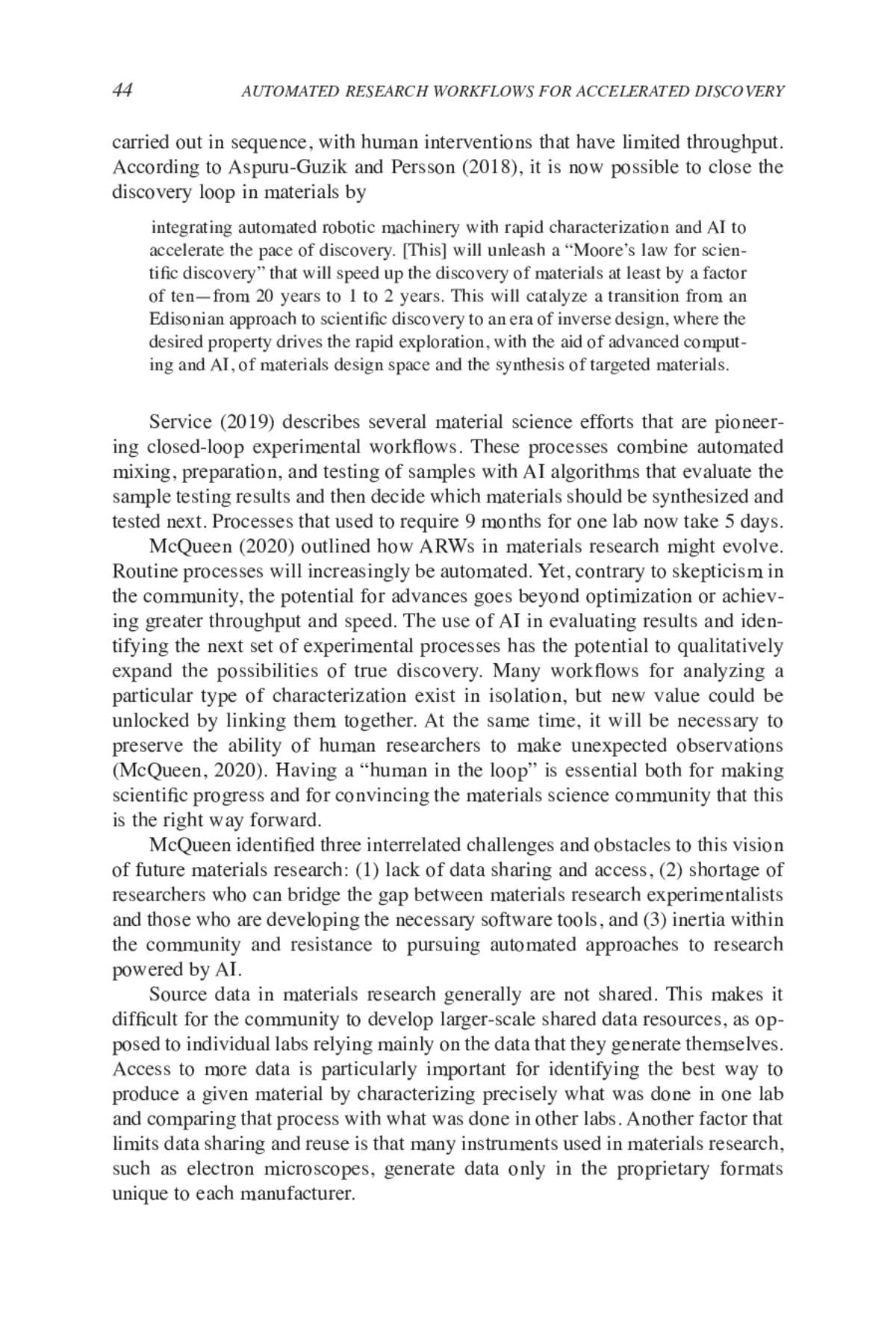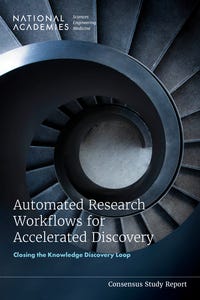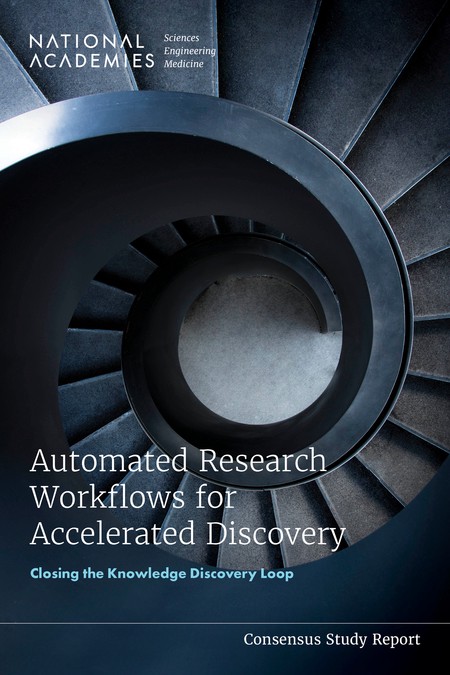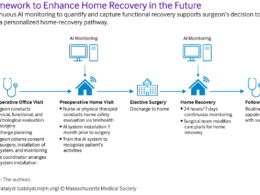New Report Offers Recommendations to Advance Their Development
National Academy of Sciences
May 10, 2022
In many disciplines, automated research workflows (ARWs) — which integrate computation, laboratory automation, and tools from artificial intelligence — are demonstrating the potential to vastly increase the speed and efficiency of a range of research activities, says a new report from the National Academies of Sciences, Engineering, and Medicine.
In many disciplines, automated research workflows (ARWs)…are demonstrating the potential to vastly increase the speed and efficiency of a range of research activities
Realizing the potential of ARWs could accelerate the pace of scientific discovery by orders of magnitude, thereby expanding the research enterprise’s contribution to society, the report says.
It offers recommendations to research institutions, funders, and other stakeholders to advance the development of these tools.
ARWs are being used to design and conduct experiments, analyze data, and observe natural phenomena, the report says.
While current utilization of ARWs varies quite a bit by discipline, developments in multiple domains are beginning to deliver on ARWs’ potential.
For example:
In materials science:
Research groups are building systems in which a combination of laboratory automation and machine learning is
- cutting the time required for synthesis and testing of materials
- from nine months to five days.
In drug discovery:
An active learning algorithm identified 57 percent of the active compounds
- by performing 2.5 percent of the possible experiments,
- compared with 20 percent identified through a traditional approach of building a model for each target.
Researchers in the social and behavioral sciences
Are using new data resources and advanced analytics to better understand and address a variety of pressing problems, including
- poverty alleviation and
- strengthening the delivery of public services in cities.
In addition to increasing the speed and efficiency of research, the greater transparency and repeatability made possible by automating and capturing specific steps in the research process — advances that underlie the development of ARWs — can foster reproducibility, replicability, and responsibility in research, the report says.
Team science workflow process

Actions needed to realize potential of ARWs
The report recommends that research funders — working with other stakeholders such as scientific societies, research institutions, and publishers — place greater priority on approaches to ensuring the creation and sustainability of key systems, tools, platforms, and data archives for ARWs.
The report identifies design principles that ARWs should embody, such as
- facilitating openness and transparency,
- following the principles of responsible AI and machine learning, and
- prioritizing the reuse and sustainability of existing tools when possible and appropriate.
Organizations that fund, perform, and disseminate research, along with scientific societies, should enable ARWs that follow these principles.
In addition, funders, research institutions, and disciplines should work to create an ARW-friendly culture by making changes in incentive and reward structures aimed at encouraging behaviors that are central to realizing the potential of ARWs — for example, encouraging team science and multidisciplinary teams and developing and sharing software resources.
In addition, research funders, higher education and research institutions, and scientific and professional societies should support the development and implementation of educational programs and career pathways aimed at building the workforce needed to develop and utilize ARWs.
Legal and policy issues will affect implementation of automated research workflows in specific domains, and will require international multi-stakeholder efforts to address them, the report notes.
For example, ARWs will need to be designed to comply with institutional policies and government regulations intended to protect personal data privacy, and to provide transparency in results from data use.
The study — undertaken by the Committee on Realizing Opportunities for Advanced and Automated Workflows in Scientific Research — was sponsored by Schmidt Futures.

Originally published at https://www.nationalacademies.org
Login |The National Academies Press
Returning Users-Log in to MyNAP Create a Free MyNAP Account ” Browse as Guest ” MyNAP members enjoy free access to…nap.nationalacademies.org
Names mentioned
Schmidt Futures
COMMITTEE ON REALIZING OPPORTUNITIES FOR ADVANCED AND AUTOMATED WORKFLOWS IN SCIENTIFIC RESEARCH
Daniel Atkins (NAE) (Chair),
W. K. Kellogg Professor Emeritus of Information and Professor Emeritus of Electrical Engineering and Computer Science, University of Michigan
Ilkay Altintas, Chief Data Science Officer, San Diego Supercomputer Center and Founding Fellow, Halicioglu Data Science Institute, University of California, San Diego
Shreyas Cholia, Group Leader, Usable Software Systems Group, Lawrence Berkeley National Laboratory Mercè Crosas, Secretary of Open Government, Government of Catalunya
Alfred Hero, R. Jamison and Betty Williams Professor of Engineering, Department of Electrical Engineering and Computer Science, University of Michigan
Rebecca Lawrence, Managing Director, F1000 Research Ltd, London, UK
Bradley Malin (NAM), Accenture Professor of Biomedical Informatics, Biostatistics and Computer Science, Vanderbilt University Lara Mangravite, President, Sage Bionetworks
Brian Nosek, Executive Director, Center for Open Science*
Tapio Schneider, Theodore Y. Wu Professor of Environmental Science and Engineering and Jet Propulsion Laboratory Senior Research Scientist, California Institute of Technology
Originally published at https://www.nationalacademies.org
Login |The National Academies Press
Returning Users-Log in to MyNAP Create a Free MyNAP Account ” Browse as Guest ” MyNAP members enjoy free access to…nap.nationalacademies.org











